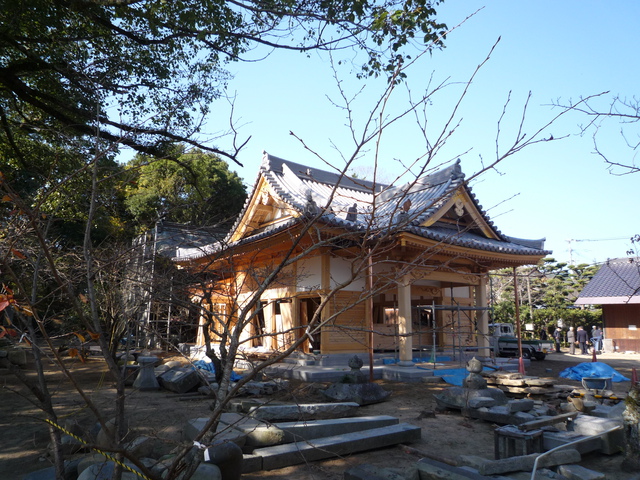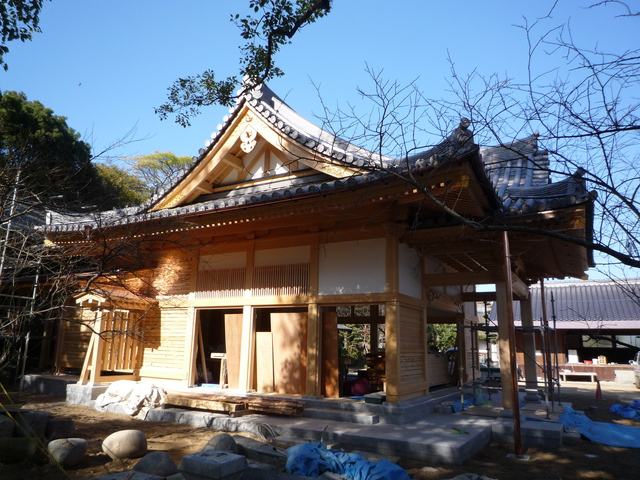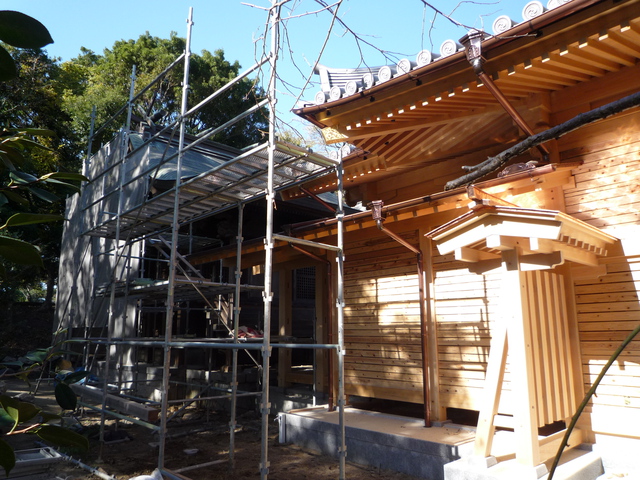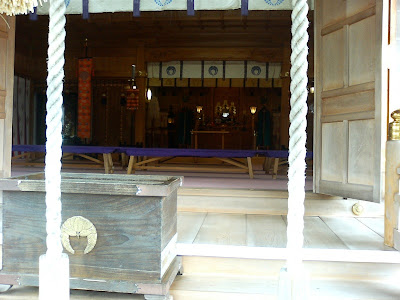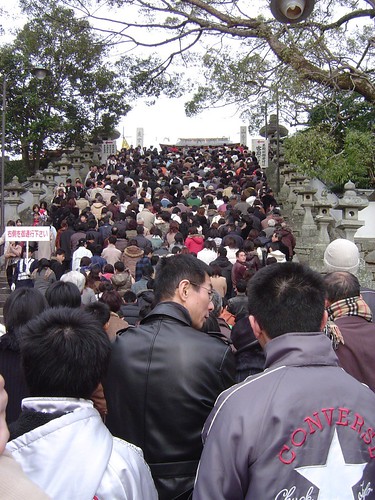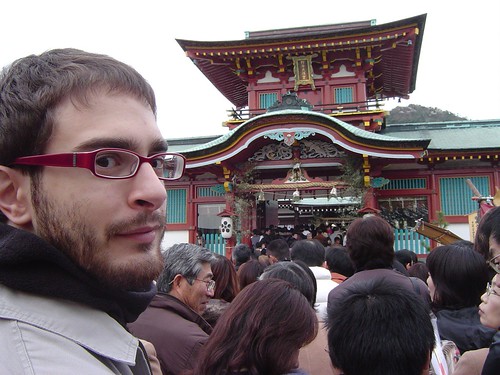Os voy a explicar paso a paso cómo fue nuestra boda japonesa sintoísta, que tuvo lugar en el templo Hofu Tenmangu. No voy a ser muy riguroso pero espero que a alguien le sirva para tener una idea general.
防府天満宮で行われた僕たちの結婚式の流れを軽く説明してみる。あまり詳しくないけど、だいたいどんな感じか知りたい人のお役に立てば、嬉しい。
I’m going to explain lightly the flow of our Japanese Shinto wedding at Yamaguchi Prefecture’s Hofu Tenmangu. I’m not going to be very accurate but I hope this entry will be interesting for some people.
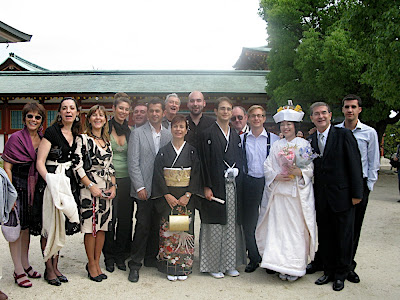
photo: josecrem
Esta es la mayoría de la gente que vino desde España a la boda. En total eran 20.
スペインから来てくれたほとんどの人。全員そろったらなんと20人。
Most of the people who came from Spain for our wedding. There were 20 of them in total.
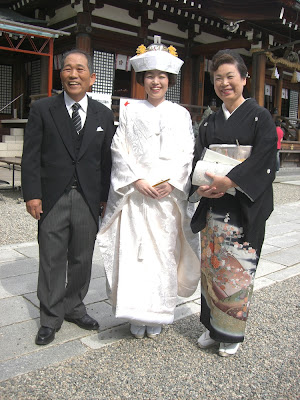
photo: Hisashi
Antes de la boda, la novia está con su familia.
挙式の直前、新婦はその親族と一緒。
Before the ceremony, the bride is with her family.
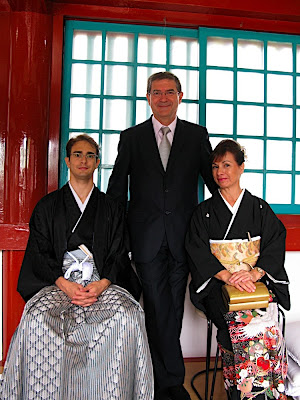
photo: josecrem
Y el novio con la suya. Hay una habitación habilitada en plan camerino para cada «equipo».
新郎はまたその親族(と親友)の控え室にいた。
And the groom is with his. There’s a backstage-like room for each «team».

photo: josecrem
Aquí el equipo de la novia sentado en dos filas, en el lado izquierdo de la capilla principal. Si pudiéramos mirar a la derecha de esta foto se vería el altar.
本堂の左側で二列に並んだ「新婦チーム」。この写真の右に本堂があった。
Here’s the bride’s team sitting in two rows, on the left side of the main shrine. If you could have a look at the right of this picture you would see the shrine.

photo: Hisashi
Y mi equipo sentado frente a ellos, en el lado derecho de la capilla. Era la primera vez que muchos de los españoles entraban en un jinja (templo sintoísta) pero todo fue muy mágico, emotivo, y todos los invitados siguieron el protocolo como un solo hombre.
そして向かい合わせで座った僕のチーム。神社に入るのが初めてというスペイン人が多かったけど、自然に流れにのれたみたい。神秘的、感動的な時間が続いた。
And this is my team sitting opposite to the other, on the right side of the shrine. It was te first time many of these people went into a jinja (Shinto shrine) but everything felt like magic and it was very moving. People would follow the ceremony perfectly.
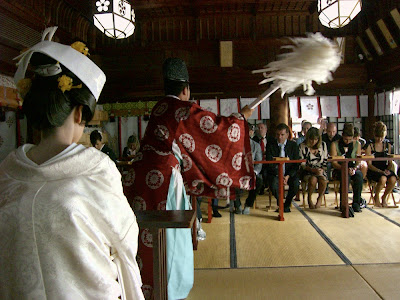
photo: Hisashi
El sacerdote nos bendice a todos antes de empezar la ceremonia. Agachamos ligeramente la cabeza.
みんなにお祓いをしてくれる神主さん。頭を軽く下げる。
The priest blesses us all before starting. We bow slightly.
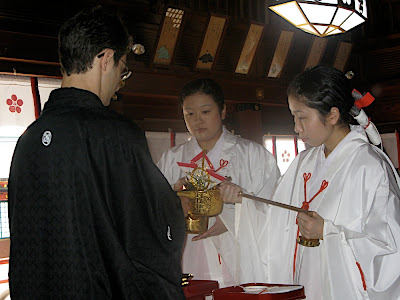
photo: josecrem
Sansankudo: las miko (monaguillas) me ponen o-miki (sake sagrado) en tres platos de forma consecutiva. Cada uno de los platos me lo acerco a la boca dos veces y solo bebo a la tercera. Total: nueve intentos y tres tragos.
三三九度。巫女さんが盃三枚にお神酒を注いでくれた。一枚ごとに、三回口につけてその三回目だけ飲む。合計は、九回口につけてその中から三回だけ飲む。
Sansankudo: the miko (shrine maidens) serve me omiki (sacred sake) on three dish-shaped cups. Every cup, I take it near my mouth for 3 times but only drink the last one. Totals: 9 tries, 3 successes.
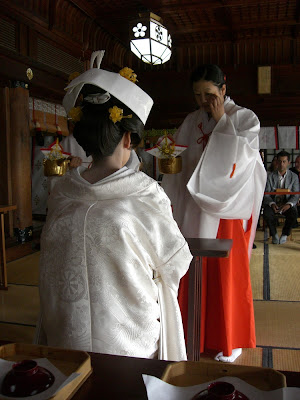
photo: Hisashi
Ai solo se mojó los labios porque el alcohol le sienta mal. Creo que lo que le sobró a ella me lo pusieron todo a mí.
愛はお酒に弱いから、口をつけることだけにした。残されたお神酒は全部僕に回ってきた気がする。
Alcohol is no good for Ai’s body, so she didn’t drink any of the omiki she was served. I have a feeling they gave me all of her leftovers.
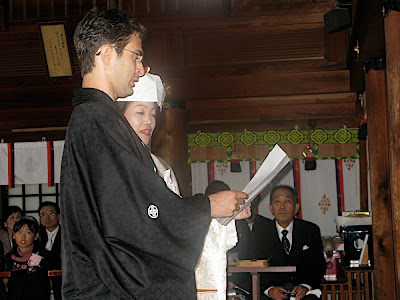
photo: Hisashi
Leemos al unísono los votos de matrimonio. Es un japonés difícil, pero como para muchos japoneses también es complicado siempre hay anotaciones con la pronunciación de los kanji.
誓いの言葉を二人で一緒に読み上げる。複雑な漢字ばかりだけど、幸い日本人にとっても難しいのか、ふりがながついていた。
We read together our wedding vows. They are filled with rare kanji but it looks like they are hard for many Japanese people so there were hints for pronunciation everywhere.

photo: Hisashi
Intercambio de anillos. A mí se me cayó el suyo al suelo pero creo que no se dio cuenta nadie (una de las dos partes de esta frase es mentira, hagan sus apuestas).
指輪交換。僕は落としたけど誰も気付かなかったかな?(そんな訳ないけど)
Exchanging rings. I dropped Ai’s ring but I think nobody noticed. Game: find a lie in last sentence.
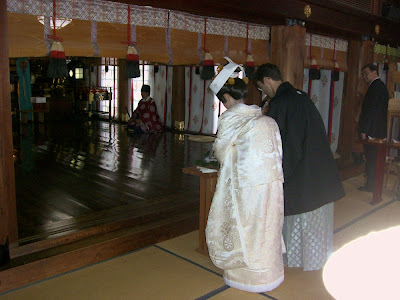
photo: Hisashi
Tamagushi hōten: ofrecemos unas ramas al altar. Tenemos que girarlas doscientos setenta grados en el sentido de las agujas del reloj para que queden mirando en la dirección correcta.
玉串奉奠。枝が本堂に向くように、時計回りに二百七十度回した。
Tamagushi hōten: offering some branches to the Shrine. We had to turn them two hundred and seventy degrees clockwise so that they were oriented to the Shrine.
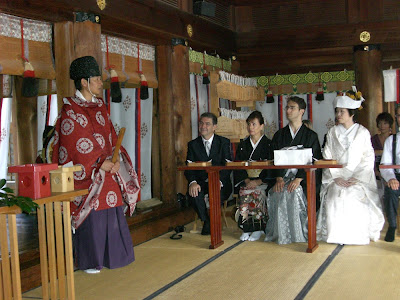
photo: Hisashi
El sacerdote da su bendición a nuestro matrimonio.
神主さんからお祝いの言葉をもらった。
The priest then gave us his blessing for our marriage.
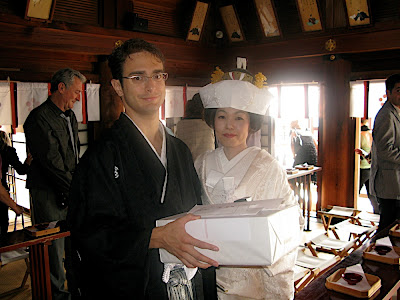
photo: josecrem
Un regalo de parte del templo. ¡No me lo esperaba! La ceremonia había ido como la seda y todo el mundo estaba emocionado y súper contento.
防府天満宮からのプレゼント。期待していなくて嬉しかった!式がスムーズに流れて、みんな感動していたし、喜んでいた。
A present from the Shrine. I didn’t expect it! The ceremony had been smooth and moving, and people were very happy.
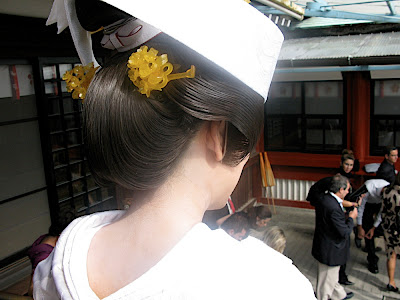
photo: josecrem
Y salimos del templo y nos fuimos a… ¡continuará!
そして神社を後にすると・・・つづく!
So we came out of the Shrine and… To be continued!

